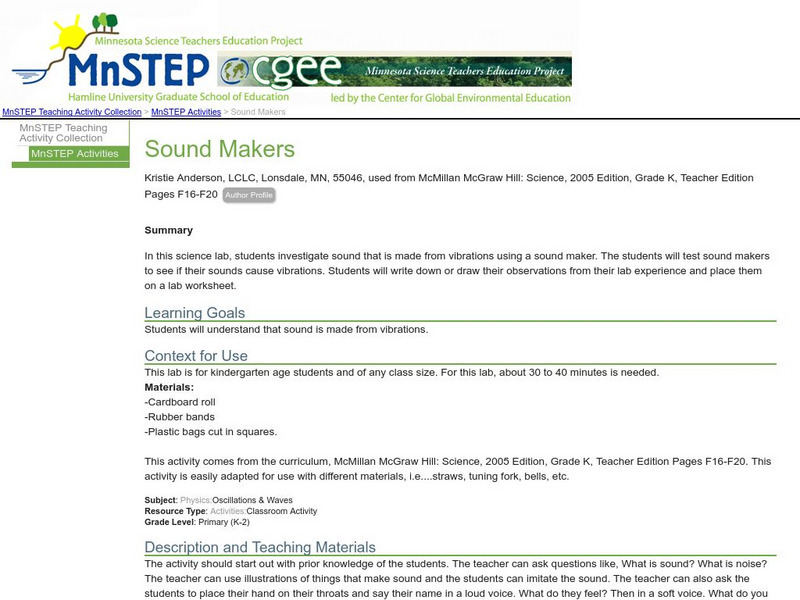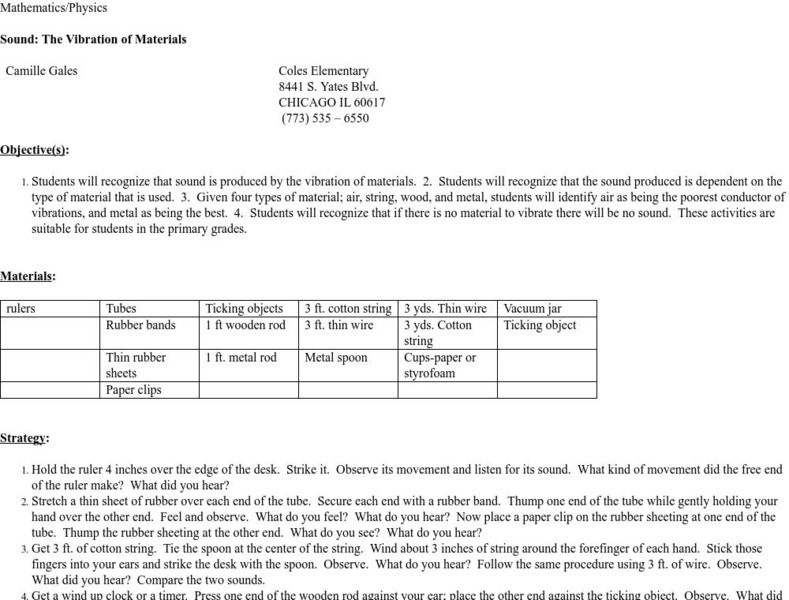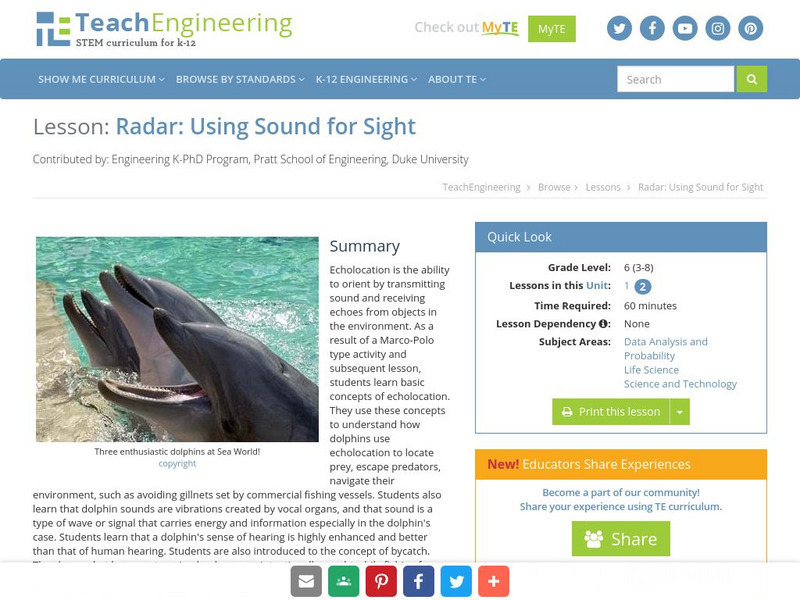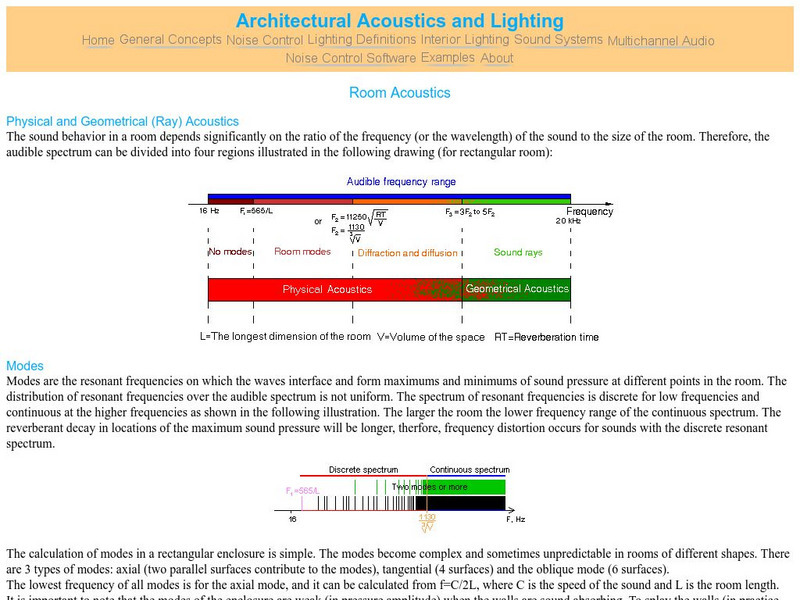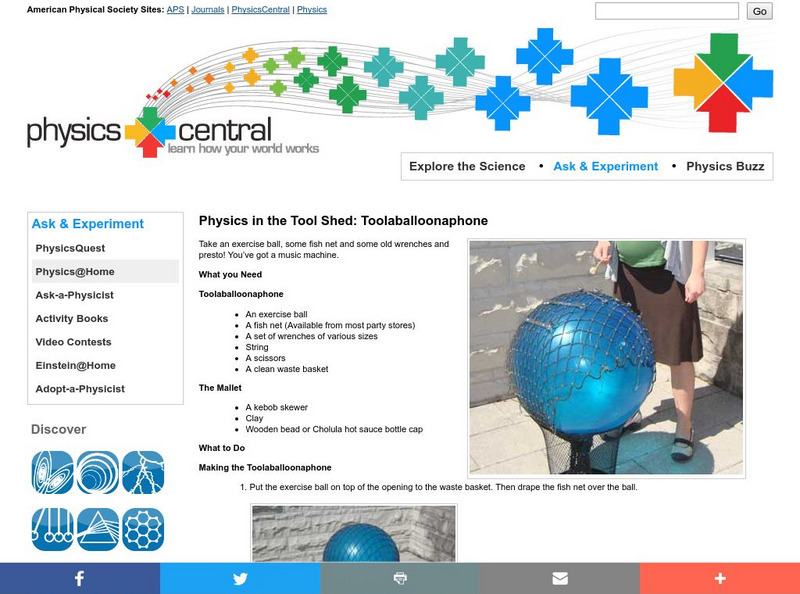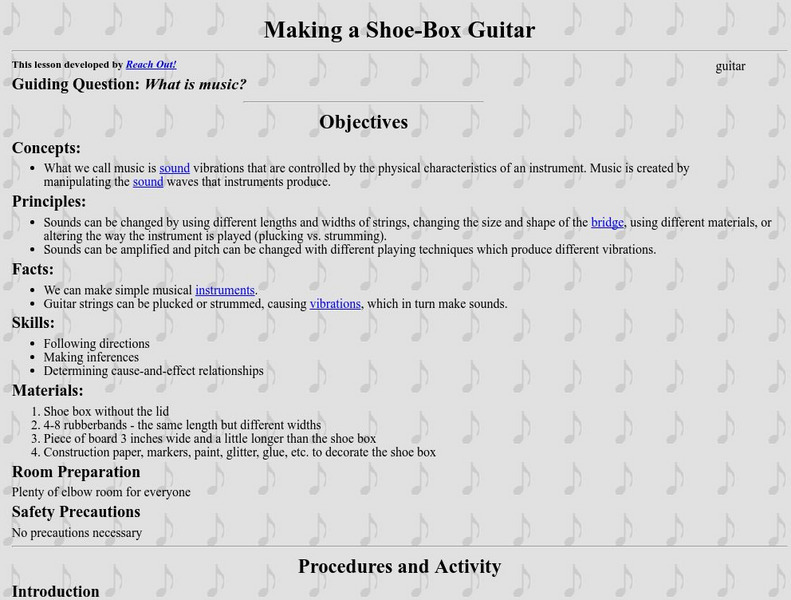Hi, what do you want to do?
Science Education Resource Center at Carleton College
Serc: Exploring Sound: Length Makes a Difference
Students begin to explore the relationship between the length of an object and the sound it produces as it vibrates, by using a wood or plastic ruler and the edge of a desk or table.
University of Kentucky
The Physics and Math of Music
Read about a math research project done by three college students which helps us see physics and math in music. Here's a great approach for integrating curriculum!
Science and Mathematics Initiative for Learning Enhancement (SMILE)
Smile: Ears and Hearing
This lesson plan investigates sound waves and how the ear hears. Students create a model of the ear using a cardboard tube, plastic wrap, and a sheet of paper.
Science Education Resource Center at Carleton College
Serc: Mn Step: Sound Makers
For this activity, young scholars make a sound cylinder using a cardboard tube, and investigate the sound wave vibrations they can feel at its end when they speak into it.
PBS
Pbs Teachers: Make a Guitar, Vibration Experiment
Experience how vibrations make sound by constructing a guitar using rubber bands and a cereal box.
Science and Mathematics Initiative for Learning Enhancement (SMILE)
Smile: Sound, the Vibration of Materials
Great activity for primary and intermediate pupils to learn why objects make noise. This can be organized in stations or in groups of students.
Science and Mathematics Initiative for Learning Enhancement (SMILE)
Smile: Sound and Vibration
Using some basic items, you can demonstrate the basic principles of sound, pitch, and vibration. This will allow the elementary student to discover some basic principles of sound and vibrations.
The Franklin Institute
Franklin Institute: Music to Our Ears
Discover the connection between sound waves and hearing with this webpage tutorial. Be sure to click on the picture for detailed information.
Other
Gcse: Sound Pitch
Informational site on sound provides waveform illustrations of sound pitch. Provides additional information on ultrasounds, waves, reflection and much more.
Teachers TryScience
Teachers Try Science: Musical Coat Hangers
From the National Science and Technology Centre in Australia comes this easy experiment that shows how sound waves travel and what materials are good conductors of sound.
TeachEngineering
Teach Engineering: The Energy of Music
Students are introduced to sound energy concepts and how engineers use sound energy. Through hands-on activities and demonstrations, students examine how we know sound exists by listening to and seeing sound waves. They learn to describe...
Physics Classroom
The Physics Classroom: Forced Vibration
This physics tutorial explores forced vibration. Includes links to natural frequency, standing wave patterns and fundamental frequency and harmonics.
Physics Classroom
The Physics Classroom: Waves, Sound and Light: Longitudinal Pulse
The animation portrays a medium as a series of particles connected by springs. In this type of longitudinal wave the particles of the medium vibrate in a direction parallel to the direction of energy transport.
Mocomi & Anibrain Digital Technologies
Mocomi: What Is Sound?
Defines sound, how it travels, the components of a sound wave, the different types, and other fun facts.
University of New South Wales (Australia)
University of New South Wales: Introduction to Acoustics of Brass Instruments
Discover the acoustical properties of brass instruments from this well researched site provided by the University of New South Wales. Everything from lip control to bell shape is discussed as it applies to frequencies and harmonics.
University of New South Wales (Australia)
University of New South Wales: Introduction to Clarinet Acoustics
Learn about how the acoustics of a clarinet work by exploring this well researched site. You'll learn about the frequencies, the effects of the reed, the tone holes and more.
McREL International
Mc Rel: Whelmer #10 Learning Activity: Singing Rod
An easy to do activity that investigates the simple observable properties of sound waves. The activity is presented in lesson plan format that meets NSES standards.
Science Education Resource Center at Carleton College
Serc: Investigating Sound: A Lesson in Length and Pitch
In this classroom guided inquiry instructional activity, students will rotate through five stations of various sound instruments to look at how length affects pitch. The five sound stations include: straw flutes, xylophone, water phone,...
TeachEngineering
Teach Engineering: Sound for Sight
Echolocation is the ability to orient by transmitting sound and receiving echoes from objects in the environment. As a result of a Marco-Polo type activity and subsequent lesson, students learn basic concepts of echolocation. They use...
ClassFlow
Class Flow: Good Vibrations
[Free Registration/Login Required] This flipchart is intended to introduce fifth grade students to the science of musical instruments. Concepts covered include wind, percussion, and string instruments. Also, the relationship between...
Other
Architectural Acoustics and Lighting: Room Acoustics
This site from Architectural Acoustics and Lighting provides a discussion of various factors affecting the acoustics of a given room. Room dimensions, the wavelength of the sound wave, the physical characteristics of the walls, the...
Physics Central
Physics Central: Physics in the Tool Shed: Toolaballoonaphone
Learn about compression waves and amplification through constructing a toolaballoonaphone! The toolaballoonaphone is made out an exercise ball, fish nets, wrenches, strings, scissors, and a clean waste basket that allows students to...
Michigan Reach Out
Michigan Reach Out!: Making a Shoe Box Guitar
This site provides an experiment where students create a guitar to discover what variables will change sound.
E-learning for Kids
E Learning for Kids: Science: Seychelles: How Do We Hear?
This lesson teaches students about how sound vibrations are transmitted through solids, liquids, and gases, and about how materials may absorb sound.








